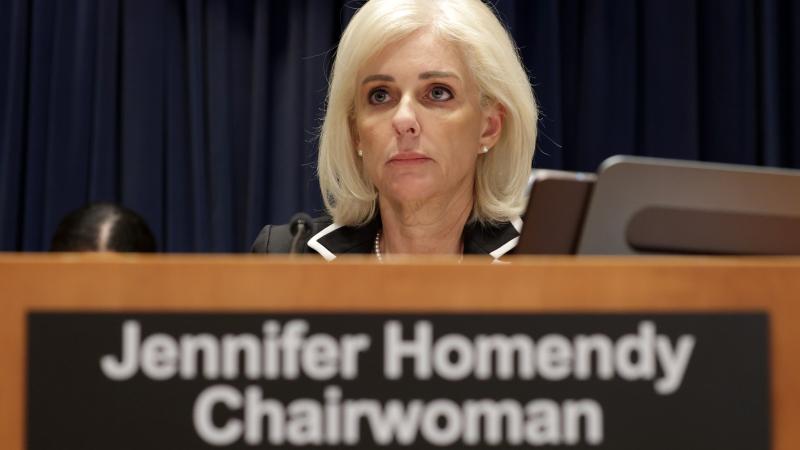Charlie Kirk gave detransitioners visibility. Proposed medical codes would carry on his work.
Presentation to CDC committee seeks "real classification system to identify and help patients who suffer from an attempt to change their sex." Full appeals court ruling could limit number of young people with post-transition regret.
Among the outpouring of grief and fond remembrances following the murder of conservative TV host Charlie Kirk, detransitioners are praising the Turning Point USA founder for giving them early visibility in a society that celebrates gender identity without acknowledging the mental and physiological changes from so-called gender-affirming care that can drive regret.
Proposed additions to medical codes and legal protections for insurers to deny coverage for medicalized gender transitions could take the baton from Kirk, making detransitioners visible for the first time in the medical system while limiting the number of young people who start the gruesome and expensive hormonal and surgical journey to resembling the opposite sex.
Do No Harm medical director and psychiatrist Kurt Miceli gave a presentation Wednesday to the Centers for Disease Control and Prevention's ICD-10 Coordination and Maintenance Committee, noting gender dysphoria "in remission" is missing from the "diagnostic lexicon" in the International Classification of Disease, Tenth Revision, code sets in the U.S.
This is despite the reportedly high rate of desistance from gender confusion absent affirmation and complications from surgical and hormonal interventions such as urinary problems and bone thinning, Miceli told the committee, which reviews proposed revisions while the Department of Health and Human Services has final authority to make them.
The full 11th U.S. Circuit Court of Appeals overturned a divided three-judge panel that said the health plan for public employees in Georgia's Houston County "facially discriminates because of sex" by denying drugs, services and supplies for both "sex change" and reversal.
The case will now go to trial to decide whether the plan discriminates specifically against sheriff's deputy Anna Lange.
The Supreme Court rejected many of Lange's arguments for insurance to cover "male-to-female" surgery by upholding Tennessee's ban on blockers and hormones for gender-confused minors, the majority said. The county plan "does not treat anyone differently based on a protected characteristic" in violation of Title VII of the Civil Rights Act.
"You gave me a chance as a young ex-trans person to share my story and find new community" by speaking at Turning Point USA events, self-described "former Bernie Bro transgender woman" and detransition coach Laura Becker said in remembrance of Kirk.
"You treated every single young trans-identifying person you debated with the utmost respect," in videos that Maia Poet saw "when I was still deeply entrenched in the cult" of gender ideology, she said. "It was your compassionate approach that made me realize that there were good people on the other side" and "just how much the woke left had lied to me."
Medical code for first-time turtle accident but not detransitioning
Do No Harm's Miceli previewed his presentation in The Wall Street Journal on Tuesday, proposing several new ICD-10 codes to create a "real classification system to identify and help patients who suffer from an attempt to change their sex," such as detransitioner and activist Chloe Cole, "so they can receive the care they deserve and benefit from real medical research."
Bothered by her early puberty and unwanted attention from boys, "tomboy" Cole at age 12 went on puberty blockers, followed by testosterone and a double mastectomy, after doctors pushed her and her parents "to accept the lie that she could become a boy," reaffirming the message she heard in "online communities," Miceli wrote.
She desisted at age 16 but "had no path back to healing and hope" because the medical establishment affirms transition while refusing to admit "it can ever be a mistake."
ICD-10 codes exist for gender transitions and "amusingly specific" maladies such as "burn due to water-skis on fire," but their absence for post-medical detransition makes it impossible to accurately count detransitioners and "more difficult for researchers to help them" through "real-world data," said Miceli, whose group opposes identity politics in medicine.
Do No Harm senior fellow Travis Morrell highlighted the code "doctors use to tell insurance you’ve been struck by a turtle for the first time," W59.22XA.
Miceli's CDC presentation proposed new codes that would establish gender dysphoria in remission, "posttranstion distress" such as "mourning" bodily changes and "feeling betrayed" by clinicians, and distinguish medical and surgical "sex reassignment."
They would account for social transition to "better account" for medical complications and for "personal history of detransition unrelated to the reason one may have detransitioned."
Asked to explain the social-transition proposal, Miceli cited pre-medicalization practices such as "tucking and binding" that accompany name and pronoun changes. Male-identified girls who bind their breasts may experience "shortness of breath," and that code could track their complications and give "more clinical clarity" to their state of transition, he said.
While transgender activists cite surveys that "hardly any kids regret the effects of hormones and surgeries," the surveys "tend to focus on short-term data, suffer from bias, or both," Miceli's op-ed said. (Science journalist Jesse Singal has probed methodological problems with studies used to justify rushing children into drug therapy.)
Other studies found an 80% desistance rate without medical transition and identified "most of these kids" as gay, Miceli wrote, echoing arguments by the Women's Liberation Front, which portrays gender transition as a form of conversion therapy against homosexuals.
Insurance also rejects exact opposite, medical detransitioning
The full 11th Circuit ruling that said gender-affirming insurance denial does not violate civil rights came two months after SCOTUS overturned a 4th Circuit ruling that held the opposite.
The high court remanded that case for further consideration in light of its ruling upholding Tennessee's ban on medicalized gender transitions for minors, which declined to make transgender people "a suspect or quasi-suspect class" but adopted much of the language of transgender activists, frustrating gender-ideology opponents.
The 11th Circuit majority of eight judges acknowledged the oddity of referring to cosmetic procedures to resemble the opposite sex as a "sex change," which is biologically impossible, but noted that Houston County's health plan explicitly uses that phrase.
The plan paid for all or "the bulk" of "hormones, endocrinologist visits, and psychologist visits" for Lange, only denying so-called bottom surgery – removal of testicles, creation of a "neovagina" and "extensive regimen of post-surgery dilatation" to prevent the neovagina from closing – that Lange planned to get in New York, the ruling said.
The only question the full circuit accepted was whether the denial facially violates Title VII, and the Tennessee ruling precludes all four of Lange's arguments, according to the majority.
"The County’s policy does not pay for a sex change operation for anyone regardless of their biological sex," wrote Judge Andrew Brasher, nominated by President Trump. "If Lange were instead a natal woman who wanted a female-to-male sex change," or sought a male-to-female procedure for "a male dependent," insurance would deny it.
The specific procedures Lange sought also don't make the insurance denial sex-based, since the policy's terms deny coverage for a neovagina even if a woman sought it, "perhaps as a reversal of a previous female-to-male sex change," Brasher wrote.
Like Tennessee's ban, the county policy is a "classification based on medical use," insofar as it doesn't, say, charge transgender employees more than nontrans employees or reduce their benefits, but would cover the same procedures for "reconstructive surgery following a car accident" regardless of the patient's gender identity, the majority said.
A five-judge minority opinion by Judge Jill Pryor, nominated by President Obama, said the "line drawing" in the health plan "is impermissible in Title VII cases when the dividing line is a medical condition that impacts employees differently based on sex," citing a 1983 SCOTUS ruling.
Because "only transgender individuals can require 'sex changes,'" the county's exclusion is "transgender-based," Pryor wrote, quoting the employment discrimination SCOTUS precedent Bostock that under Title VII "it is impossible to discriminate against a person for being … transgender without discriminating against that individual based on sex."
The Facts Inside Our Reporter's Notebook
Links
- gruesome and expensive hormonal and surgical journey
- Kurt Miceli gave a presentation
- ICD-10 Coordination and Maintenance Committee
- desistance from gender confusion absent affirmation
- full 11th U.S. Circuit Court of Appeals overturned
- "facially discriminates because of sex"
- The case will now go to trial
- "former Bernie Bro transgender woman"
- detransition coach Laura Becker said
- Maia Poet saw "when I was still deeply entrenched
- The Wall Street Journal
- "doctors use to tell insurance youâve been struck by a turtle for the first time,"
- methodological problems with studies used to justify rushing children
- gender transition as a form of conversion therapy
- SCOTUS overturned a 4th Circuit ruling
- upholding Tennessee's ban on medicalized gender transitions
- 1983 SCOTUS ruling













